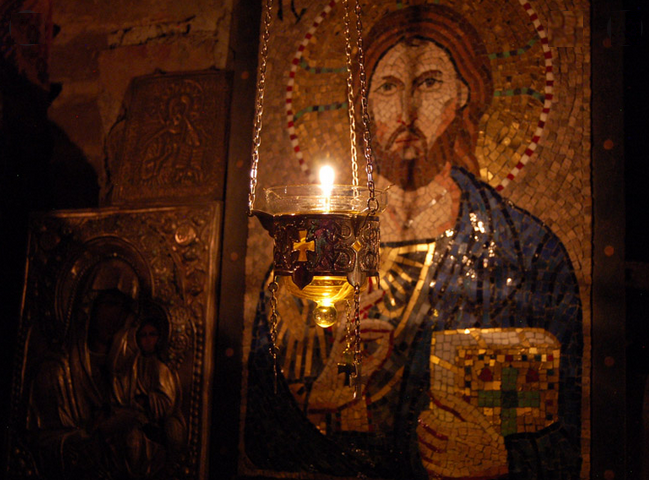Editor’s note: The following comprises the fifth chapter, first part (A12), of The Gospel of Luke: An Exposition, by Charles R. Erdman (published 1936). All spelling in the original.
12. An Exhortation to Watchfulness (12:35-48)
___________________________________________________
35 Let your loins be girded about, and your lamps burning; 36 and be ye yourselves like unto men looking for their lord, when he shall return from the marriage feast; that, when he cometh and knocketh, they may straightway open unto him. 37 Blessed are those servants, whom the lord when he cometh shall find watching: verily I say unto you, that he shall gird himself, and make them sit down to meat, and shall come and serve them. 38 And if he shall come in the second watch, and if in the third, and find them so, blessed are those servants. 39 But know this, that if the master of the house had known in what hour the thief was coming, he would have watched, and not have left his house to be broken through. 40 Be ye also ready: for in an hour that ye think not the Son of man cometh.
41 And Peter said, Lord, speakest thou this parable unto us, or even unto all? 42 And the Lord said, Who then is the faithful and wise steward, whom his lord shall set over his household, to give them their portion of food in due season? 43 Blessed is that servant, whom his lord when he cometh shall find so doing. 44 Of a truth I say unto you, that he will set him over all that he hath. 45 But if that servant shall say in his heart, My lord delayeth his coming; and shall begin to beat the menservants and the maidservants, and to eat and drink, and to be drunken; 46 the lord of that servant shall come in a day when he expecteth not, and in an hour when he knoweth not, and shall cut him asunder, and appoint his portion with the unfaithful. 47 And that servant, who knew his lord’s will, and made not ready, nor did according to his will, shall be beaten with many stripes; 48 but he that knew not, and did things worthy of stripes, shall be beaten with few stripes. And to whomsoever much is given, of him shall much be required: and to whom they commit much, of him will they ask the more.
___________________________________________________
Our Lord had been warning His disciples against allowing their minds to be absorbed in the selfish acquisition of wealth, and against being anxious about needed food and clothing; they were to be supremely concerned about His Kingdom which would appear in glory at the time of His return. As to the events preceding this return, as to its circumstances and results, He taught them more definitely just before His death; here He simply enjoined upon them the attitude of watchfulness, implying that if His coming was occupying their thoughts they would be kept at once from worldliness and from worry, and would be diligent in serving Him.
He illustrated this attitude of heart and mind by two parables, the parable of the Returning Lord and the parable of the Thief. In the former, the master has been attending a marriage, his servants are awake and clothed, the house is lighted, and all are ready to receive him. So delighted is he on his arrival to find them faithful that he is ready to give any expression to his joy; he even is willing to cause them to sit down and to partake of the banquet they have prepared for him.
The second parable illustrates the truth that as the time when a thief will come is unknown, therefore the only way to act is to be ready at all times for his approach; therefore, our Saviour added, “Be ye also ready: for in an hour that ye think not the Son of man cometh.”
The Master here as elsewhere indicated that His return was to be delayed; His absence was to be like a long night; much must transpire, much be done before He would reappear, but His followers must ever be prepared for his return. This did not mean that they were to be nervously expectant nor were they to be saying that the day of His coming was just at hand; rather they were to be at their places of duty, faithfully performing their tasks, and absorbed in the work which the Master had given them to do.
This attitude of watchfulness, and of interest in the return of Christ, should particularly characterize teachers and leaders. This is the force of the question which Peter now asked. He inquired whether all believers would share equally in the blessings of the Lord’s return; would not those, like the apostles, who had been most prominent in His service receive from Him a greater reward? Jesus replied that larger privileges imply greater temptations and greater responsibilities. If a Christian minister has been faithful in feeding his people with spiritual food, he will be rewarded with even higher opportunities for service; but if the long delay of his Lord’s return shall make him forgetful and unmindful of its reality, if he shall use his high position selfishly or shall use his power unkindly, then when the Master appears he will be punished with the utmost severity.
The chief advantage of a religious leader lies in his opportunity for knowing more fully the teachings of Christ; his superior knowledge, therefore, will be the ground of his more terrible punishment in case of unfaithfulness; the principle is abiding and applies in every sphere. “To whomsoever much is given, of him shall much be required.”
Thus Christ taught that in the future there will be degrees and gradations both of punishments and rewards.
(Go back to previous chapter)
(Continue to next chapter)









